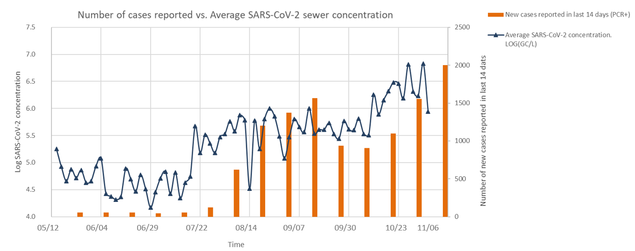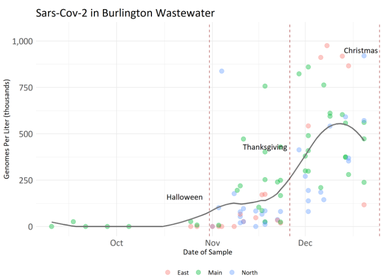GoAigua, The European Company With The World's Largest Operation To Detect SARS-CoV-2 In Wastewater, Is Helping Communities In New England Stop The Spread
By Pablo Calabuig, President and CEO, GoAigua Inc.
Community testing for COVID-19 has become a hot topic in the last months, especially when looking at wastewater. Since March 2020, some of Europe’s largest cities have been implementing widespread surveillance systems that are efficiently testing entire cities every day, at a neighborhood and even building level, by detecting traces of the virus RNA in wastewater. GoAigua, the leading European player in wastewater-based epidemiology, has been helping over 20 cities in Europe and performed over 20,000 tests this year to provide communities with a reliable and anticipated source of community infection assessment.
With the help of GoAigua, the Spain-based Smart Water Company and Utility Operator, cities like Madrid, Seville, or Valencia implemented sewer surveillance programs that divided the city’s sewer systems into smaller catchment areas down to the thousands of residents. By testing almost every day, GoAigua provided health officials with community infection trends and prevalence. Today, amidst the widespread wave of infections in the continent, they are even targeting specific buildings and combining the methodology with pooled saliva testing to anticipate the virus from spreading. For example, since November they have been testing wastewater from more than 400 nursing homes on the Mediterranean Coast of Spain. If the analyses return positive, they alert their personnel and they proceed to test the entire population and isolate infected patients – something they cannot simply do every day due to the lack of testing resources.
The Smart Water Company went beyond analyzing the virus in wastewater and developed a web-based platform that is helping these cities integrate real-time information from different sources. For example, they combine wastewater results, with water consumption levels, flow sensors, and rain data, which allow them to normalize the results for example when rain episodes take place. They also integrate demographic, socioeconomic, and health information at a block level, allowing communities to deploy targeted actions in those communities with a higher infection rates and lower access to health, or a higher proportion of elderly.
As an example, the City of Valencia, Spain’s third largest city with a population of approximately 1.5 million, is using GoAigua’s analytics solution to continuously monitor the concentration of coronavirus per liter water in 30 primary catchment areas and 20 secondary ones, which in combination with other parameters can be normalized to predict the prevalence of the virus in each neighborhood. The solution also provides information about nursing homes, available hospital beds, and average income, which is of great help to the city’s health officials as they make resource decisions on a daily and weekly basis. See more about the work in Valencia here: [https://www.bbc.com/news/av/world-europe-53587722/coronavirus-tracking-new-outbreaks-in-the-sewers]

Results of wastewater SARS-CoV-2 concentration in the City of Valencia (Spain) since the beginning of the pandemic vs. cases reported. Consolidated for the 30 sewersheds
Thanks to this revolutionary tool, health officials are getting a near-real-time picture of how the virus is spreading in the cities’ neighborhoods. They are anticipating official data up to a week, taking granular action proactively, and saving millions of Euros in PCR testing for the population as they direct testing to the most affected areas – and what is most important, lives.
In the United States, GoAigua is already helping communities in New England with their wastewater surveillance plans. For example, the forward-thinking City of Burlington, Vermont, has already been working with GoAigua since early October to use all this data and translate it into action.
With the help of GoAigua, Burlington split the sewer system into 6 areas with similar population and started generating data with their platform. The tool helped the City detect several outbreaks that took place shortly after Halloween and Thanksgiving – and identify in which area of the city it was taking place. Mayor Weinberger is constantly updating the data in the City’s website, and the City also deployed popup testing targeted at those places where the concentration of the virus and the vulnerability of the population was higher (link here: https://coronavirus-response-burlingtonvt.hub.arcgis.com/pages/wastewater-monitoring). To date, Vermont is the state with the lowest case count relative to total population in the entire United States. Burlington and GoAigua are emphasizing protecting high-risk residents by closely monitoring key areas such as nursing homes.

SARS-CoV-2 wastewater concentration published by the City of Burlington, VT
“After a competitive proposal process, the City of Burlington selected GoAigua to implement this phase of its wastewater-based epidemiology program because of their proven expertise in water, wastewater, and analytics. Their data-centric platform creates actionable, real-time insights that will help us make informed decisions to keep our residents healthy during this difficult time,” says Brian Lowe of the City of Burlington’s Innovation Office.
This program is integrated with other city-level actions and initiatives to keep the population of Vermont’s largest city safe. This program has been scaled up quickly to ensure it is in place before the winter months, given expert opinion that the coming months may be exceptionally dangerous with the combination of COVID-19 and the seasonal flu.
Since the early days of the pandemic, GoAigua has been rapidly deploying this program in cities around the world. To date, GoAigua is monitoring over 10 million citizens in over 20 cities and has the largest global wastewater-based epidemiology program in operation.
Originally published by BSCESNews. Republished with permission.
